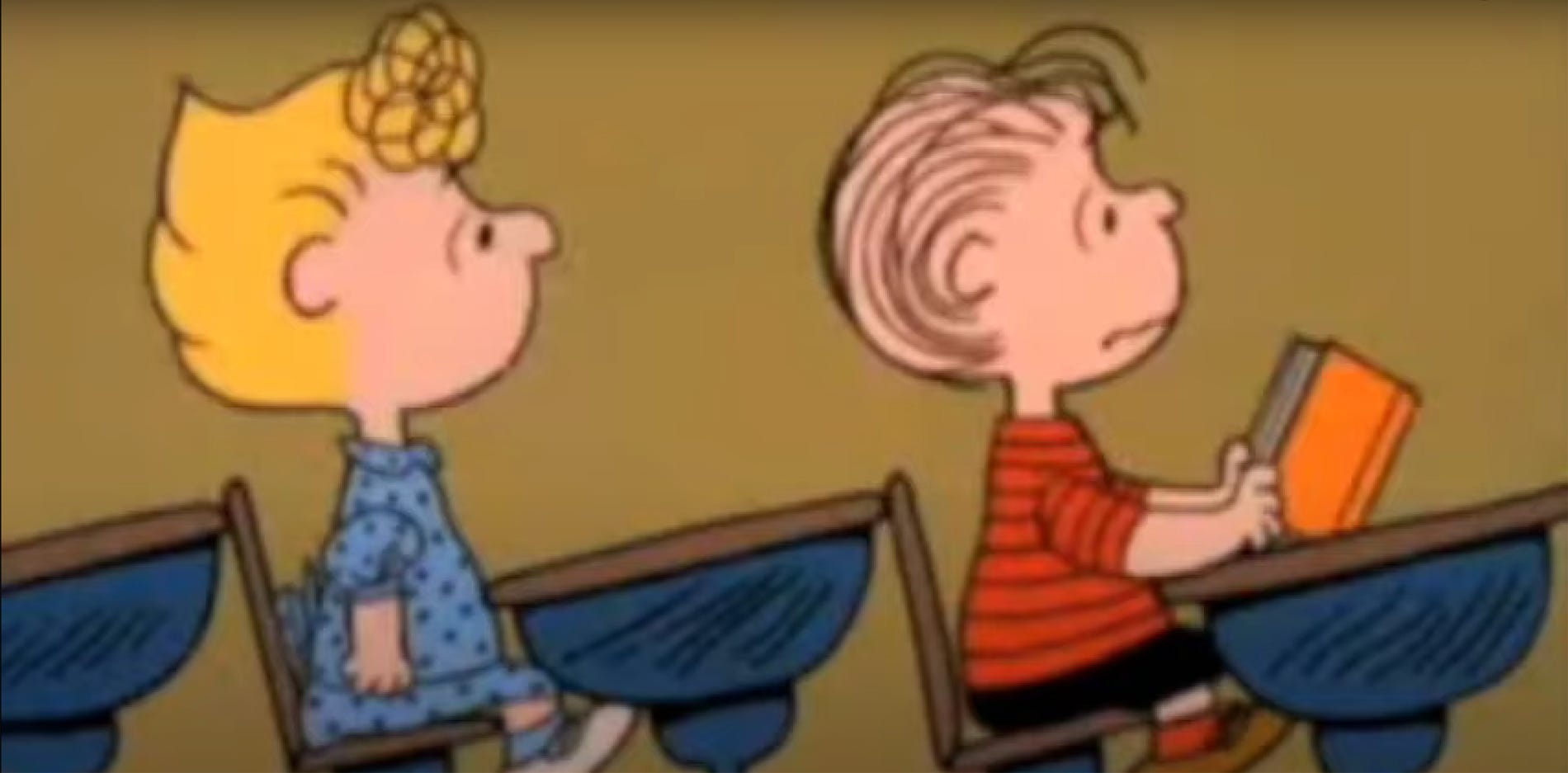✍️ How to Listen to the Nigglings
or, How to Recognize that There is Danger in Your Writing, Will Robinson!
I have a weird experience while writing sometimes.
Let me know if you get this, too. I’m writing along, minding my own business. The critic on my shoulder incessantly chatters away, but I can block him out. Sometimes though, he starts pulling on my sweater cuff. Or my collar. Or starts flicking my ear. All trying to get my attention. I ignore those, too.
When I go back to rewrite, things get all fluttery around that same spots. I once again dismiss it as the unknowning critic, whispering in my ear that everything I write is crap. (I’ve gotten quite good at ignoring the bastard – nothing special; just years of practice. The grating voice now sounds something like the wah-wahing teacher from Charlie Brown. Distant. Garbled. Ignorable.) I can even re-read a spot over and over, marvelling at how good it is. I get excited over a turn of phrase or a particular insight, even as the nigglings get more insistent.
Sometimes though – and more often, lately – the nigglings get through. The pulling on the collar rips off a button. My yanked sweater cuff tears my hand away from the keyboard. The garbled wah-wahs turn into crystal clear calls for danger ahead.
There is a problem here! You need to take this seriously!
The most chilling realization? There are two critics watching what I write, but only one of them is helpful.
DUH Duh duhhhh...
What Are the Nigglings?
In all honesty, I haven’t heard anyone else talk about the nigglings, so it might just happen to me. Except, I’ve learned that what I think is just me turns out to be actually quite common. So I’m inclined to believe that many other writers must experience this, too.
For me, the nigglings are warnings that something is wrong with the text. The thing is, I might not listen to the nigglings for various reasons.
I can be oblivious simply because I’m me. (In some circles, we call this SFHS or “Stupid Fucking Husband Syndrome”.)
I might get dazzled by my own words.
I might be in a rush.
I might be too focused on the big picture and not focused enough on the details.
I might mistake them for the rantings of the lunatic critic sitting on my shoulder, trying desperately to throw me off my game.
That’s the thing: the nigglings can too easily get lost in the background noise, drowned out, or otherwise ignored. Which is why, I suppose, they’re called “the nigglings” and not “the head bashers”.
So, what is wrong with the text that triggers the nigglings? Oh, that could be one of many things as well:
A common spelling error, like “your” instead of “you’re”.
Using the wrong word, like “interview” instead of “article”. (I did that this morning, before I wrote this...)
Conflating or confusing facts.
Stating something I didn’t fact-check that I should have.
A line or passage that references something in the article that hasn’t been written about yet (in other words, presenting details in the wrong order).
Writing that is shiny and dazzling but has absolutely nothing to do with what I’m writing about, but I write it anyway because it’s shiny and dazzling.
Something that might be too much of an extrapolation based on what I know. For example, stating a medical fact based on what I think I know, even though I don’t. (This is a particularly tricky one...)
Using superlative words like “the best” and “the greatest” when (a) it’s not necessarily true and (b) it’s better to describe specifics like “opens earliest” and “has tasty pain au chocolat” anyway.
Stuff like this happens to me all the time. I’d say every day, but as mentioned above, I’m trying my absolute best to stay away from superlatives. The times I catch these warnings before they go to the client or to print are good days. The times I don’t catch them at all are terrible.
Which is why I need to get better at listening to the nigglings...
How I Tune Myself in to Listen to the Nigglings Better
Here are a few of the things that have helped me pause and tune in to the nigglings:
I’ve learned how to distinguish between that bastard critic on my shoulder and a bona fide niggling. This is a hard one to describe. As I mentioned in the intro, there are actually two critics, but only one is helpful. Learning how to distinguish between the two is, I think, probably something I’ve developed over time. I likely started by listening to the criticism to determine if it was valid. Eventually, I could tell the difference between the voices. But that still wasn’t enough, because...
I had to learn how to actually listen to the nigglings. Just because I heard the voice doesn’t mean I paid attention to it. (See: SFHS.) I had to train myself when I got the niggling, the garbled voice, the slight tug on the cuff, the flutter around a certain spot, to actually stop and examine what was happening in the text. To be clear: I’m still not perfect!
I try to let things sit at least overnight. In my day-job writing, sometimes clients need something before EOD, which means I need to get it right, right this second. But wherever possible, I put the writing away at least overnight before finalizing, and longer if I can.
Kill your darlings. All writers have heard this expression. I don’t particularly like it, but it’s a helpful shorthand in this case. If I am particularly proud of a piece of writing, it’s a sign that I should look more closely at it. I do fall into the trap of falling in love with my own writing. That’s fine, but am I dazzled by the (perhaps unnecessary) wordplay or is there actually something great happening there that serves the story, connects with the reader, and improves piece? If the former, kill it! If the latter, well then by all means, I can pat myself on the back!
Key Takeaways: Mistakes that seem “obvious” are often far from it in the moment. Part of this may be because you are too close to it and need to let it sit before you edit. Part may be because you’ve fallen in love with your writing. Part may be that you believe you are silencing your inner critic rather than ignoring your own intuition that something isn’t working there... Learning how to listen to the nigglings and distinguish them from your inner critic will give you a better chance of changing text that doesn’t work.
Over to You: Do You Get the Nigglings?
I truly am curious – do you get the nigglings? If so, are you able to listen to them, or do they float on by unaddressed? Let us know in the comments below! I would love to get everyone’s take on it.
After I wrote this, I searched YouTube for writers talking about the nigglings, fully expecting there would be a ton of them, and found nothing. So, maybe it is just me? Instead, I leave you with a video of the wah-wah teacher on Charlie Brown. Scroll down below – it’s only seven seconds long!
Also, more congrats are in order for friend and fellow Laughing Fox writer Jean E Pendziwol, who’s book “Skating Wild on an Inland Sea” won the Governor General’s Literary Award for Young People’s Literature - Picture Books this past week. For those of you non-Canadians, the GGs are the most prestigious literary awards in Canada.
Lastly, I’m now on Blue Sky, so if you are too, look me up: @pgrahamstrong.bsky.social
Until next time... keep writing with wild abandon!
~Graham
email me if you get lost.








So funny Graham that you’ve put a name to this feeling, but I get it too for sure. I just keep going over it until the feeling is gone, or I toss it to my wife/editor and she usually flags the problem right away.
My niggle-meister is my son, who has an MFA in Fine Arts and can edit like nobody's business. He catches all of the flubs I make on a first go-round. When I get off track (with that shiny paragraph that just screams to be included), spelling (OMG it LOOKED right), dramatic tense changes, or ALL CAPS! Of course, me being me, I don't always listen. After all, it is MY writing.
Loved this article Graham. And my niggle-meister would cringe over this response. Oh well.